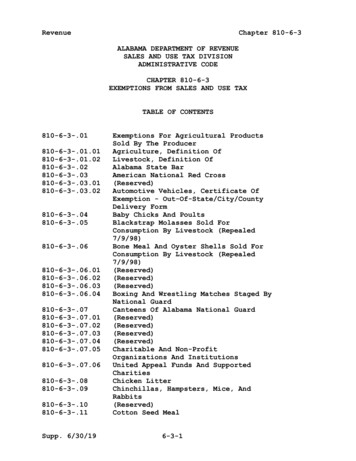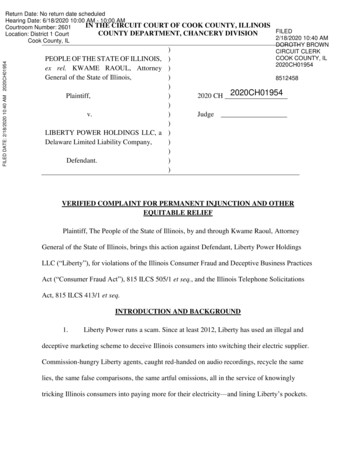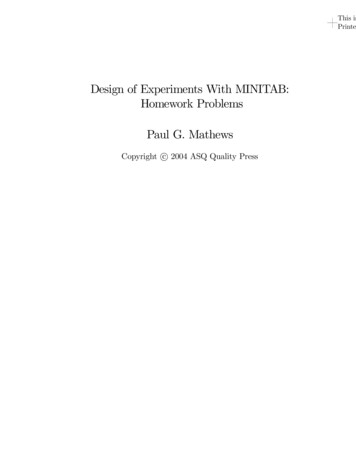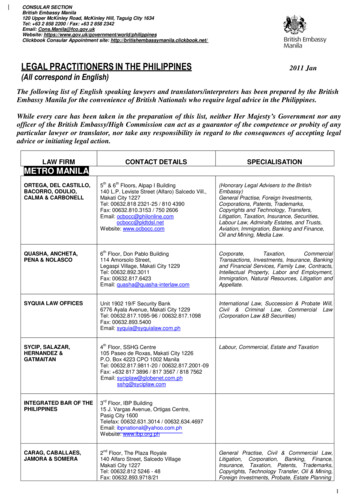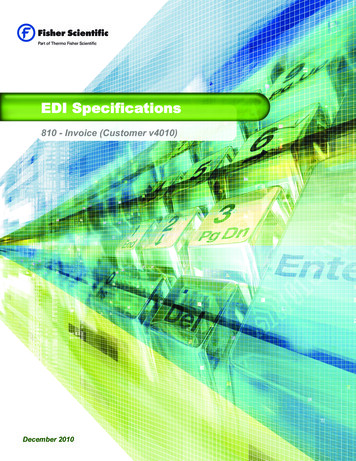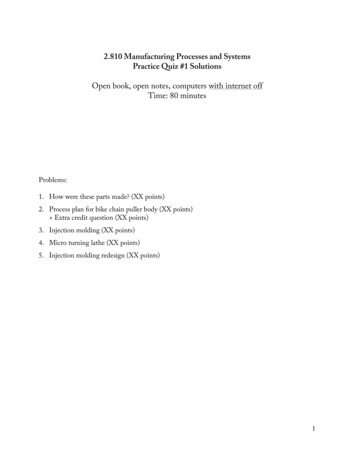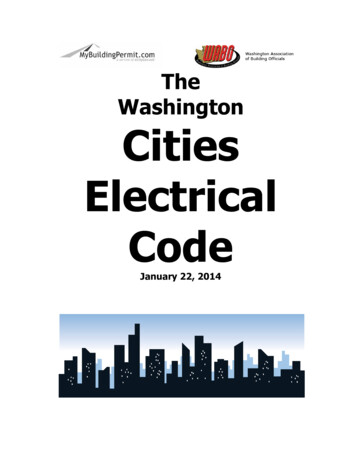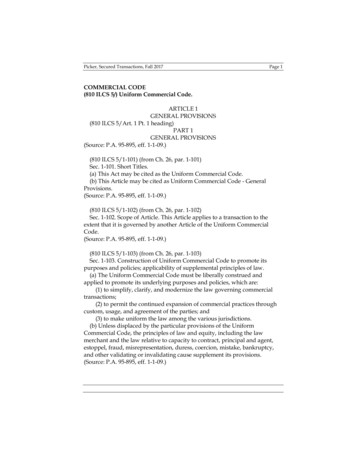
Transcription
Picker, Secured Transactions, Fall 2017Page 1COMMERCIAL CODE(810 ILCS 5/) Uniform Commercial Code.ARTICLE 1GENERAL PROVISIONS(810 ILCS 5/Art. 1 Pt. 1 heading)PART 1GENERAL PROVISIONS(Source: P.A. 95-895, eff. 1-1-09.)(810 ILCS 5/1-101) (from Ch. 26, par. 1-101)Sec. 1-101. Short Titles.(a) This Act may be cited as the Uniform Commercial Code.(b) This Article may be cited as Uniform Commercial Code - GeneralProvisions.(Source: P.A. 95-895, eff. 1-1-09.)(810 ILCS 5/1-102) (from Ch. 26, par. 1-102)Sec. 1-102. Scope of Article. This Article applies to a transaction to theextent that it is governed by another Article of the Uniform CommercialCode.(Source: P.A. 95-895, eff. 1-1-09.)(810 ILCS 5/1-103) (from Ch. 26, par. 1-103)Sec. 1-103. Construction of Uniform Commercial Code to promote itspurposes and policies; applicability of supplemental principles of law.(a) The Uniform Commercial Code must be liberally construed andapplied to promote its underlying purposes and policies, which are:(1) to simplify, clarify, and modernize the law governing commercialtransactions;(2) to permit the continued expansion of commercial practices throughcustom, usage, and agreement of the parties; and(3) to make uniform the law among the various jurisdictions.(b) Unless displaced by the particular provisions of the UniformCommercial Code, the principles of law and equity, including the lawmerchant and the law relative to capacity to contract, principal and agent,estoppel, fraud, misrepresentation, duress, coercion, mistake, bankruptcy,and other validating or invalidating cause supplement its provisions.(Source: P.A. 95-895, eff. 1-1-09.)
Page 2Picker, Secured Transactions, Fall 2017(810 ILCS 5/1-104) (from Ch. 26, par. 1-104)Sec. 1-104. Construction against implied repeal. The Uniform CommercialCode being a general Act intended as a unified coverage of its subject matter,no part of it shall be deemed to be impliedly repealed by subsequentlegislation if such construction can reasonably be avoided.(Source: P.A. 95-895, eff. 1-1-09.)(810 ILCS 5/1-104a) (from Ch. 26, par. 1-104a)Sec. 1-104a. Legislative Intent. If any provision of this Act conflicts withSection 205-410 of the Department of Agriculture Law (20 ILCS 205/205-410),the provisions of that Section 205-410 control. If any provision of this Actconflicts with the Grain Code, the provisions of the Grain Code control.(Source: P.A. 91-239, eff. 1-1-00.)(810 ILCS 5/1-104b)Sec. 1-104b. Agriculture Production Contract Code. This Act is subject tothe provisions of the Agriculture Production Contract Code.(Source: P.A. 93-522, eff. 1-1-05.)(810 ILCS 5/1-105) (from Ch. 26, par. 1-105)Sec. 1-105. Severability. If any provision or clause of the UniformCommercial Code or its application to any person or circumstance is heldinvalid, the invalidity does not affect other provisions or applications of theUniform Commercial Code which can be given effect without the invalidprovision or application, and to this end the provisions of the UniformCommercial Code are severable.(Source: P.A. 95-895, eff. 1-1-09.)(810 ILCS 5/1-106) (from Ch. 26, par. 1-106)Sec. 1-106. Use of singular and plural; gender. In the Uniform CommercialCode, unless the statutory context otherwise requires:(1) words in the singular number include the plural, and those in theplural include the singular; and(2) words of any gender also refer to any other gender.(Source: P.A. 95-895, eff. 1-1-09.)(810 ILCS 5/1-107) (from Ch. 26, par. 1-107)Sec. 1-107. Section captions. Section captions are part of the UniformCommercial Code.(Source: P.A. 95-895, eff. 1-1-09.)
Picker, Secured Transactions, Fall 2017Page 3(810 ILCS 5/1-108) (from Ch. 26, par. 1-108)Sec. 1-108. Relation to Electronic Signatures in Global and NationalCommerce Act. This Article modifies, limits, and supersedes the federalElectronic Signatures in Global and National Commerce Act, 15 U.S.C.Section 7001 et seq., except that nothing in this Article modifies, limits, orsupersedes 15 U.S.C. Section 7001(c) or authorizes electronic delivery of anyof the notices described in 15 U.S.C. Section 7003(b).(Source: P.A. 95-895, eff. 1-1-09.)(810 ILCS 5/1-109) (from Ch. 26, par. 1-109)Sec. 1-109. (Blank).(Source: P.A. 95-895, eff. 1-1-09.)(810 ILCS 5/Art. 1 Pt. 2 heading)PART 2GENERAL DEFINITIONS AND PRINCIPLES OF INTERPRETATION(Source: P.A. 95-895, eff. 1-1-09.)(810 ILCS 5/1-201) (from Ch. 26, par. 1-201)Sec. 1-201. General Definitions.(a) Unless the context otherwise requires, words or phrases defined in thisSection, or in the additional definitions contained in other Articles of theUniform Commercial Code that apply to particular Articles or parts thereof,have the meanings stated.(b) Subject to definitions contained in other Articles of the UniformCommercial Code that apply to particular Articles or parts thereof:(1) “Action”, in the sense of a judicial proceeding, includes recoupment,counterclaim, set-off, suit in equity, and any other proceeding in whichrights are determined.(2) “Aggrieved party” means a party entitled to pursue a remedy.(3) “Agreement”, as distinguished from “contract”, means the bargain ofthe parties in fact, as found in their language or inferred from othercircumstances, including course of performance, course of dealing, or usageof trade as provided in Section 1-303.(4) “Bank” means a person engaged in the business of banking andincludes a savings bank, savings and loan association, credit union, and trustcompany.
Page 4Picker, Secured Transactions, Fall 2017(5) “Bearer” means a person in possession of a negotiable instrument,document of title, or certificated security that is payable to bearer or indorsedin blank.(6) “Bill of lading” means a document evidencing the receipt of goodsfor shipment issued by a person engaged in the business of transporting orforwarding goods.(7) “Branch” includes a separately incorporated foreign branch of abank.(8) “Burden of establishing” a fact means the burden of persuading thetrier of fact that the existence of the fact is more probable than itsnonexistence.(9) “Buyer in ordinary course of business” means a person that buysgoods in good faith, without knowledge that the sale violates the rights ofanother person in the goods, and in the ordinary course from a person, otherthan a pawnbroker, in the business of selling goods of that kind. A personbuys goods in the ordinary course if the sale to the person comports with theusual or customary practices in the kind of business in which the seller isengaged or with the seller’s own usual or customary practices. A person thatsells oil, gas, or other minerals at the wellhead or minehead is a person in thebusiness of selling goods of that kind. A buyer in ordinary course of businessmay buy for cash, by exchange of other property, or on secured or unsecuredcredit, and may acquire goods or documents of title under a preexistingcontract for sale. Only a buyer that takes possession of the goods or has aright to recover the goods from the seller under Article 2 may be a buyer inordinary course of business. “Buyer in ordinary course of business” does notinclude a person that acquires goods in a transfer in bulk or as security for orin total or partial satisfaction of a money debt.(10) “Conspicuous”, with reference to a term, means so written,displayed, or presented that a reasonable person against which it is tooperate ought to have noticed it. Whether a term is “conspicuous” or not is adecision for the court. Conspicuous terms include the following:(A) a heading in capitals equal to or greater in size than thesurrounding text, or in contrasting type, font, or color to the surrounding textof the same or lesser size; and(B) language in the body of a record or display in larger type than thesurrounding text, or in contrasting type, font, or color to the surrounding textof the same size, or set off from surrounding text of the same size by symbolsor other marks that call attention to the language.(11) “Consumer” means an individual who enters into a transactionprimarily for personal, family, or household purposes.
Picker, Secured Transactions, Fall 2017Page 5(12) “Contract”, as distinguished from “agreement”, means the totallegal obligation that results from the parties’ agreement as determined by theUniform Commercial Code as supplemented by any other applicable laws.(13) “Creditor” includes a general creditor, a secured creditor, a liencreditor, and any representative of creditors, including an assignee for thebenefit of creditors, a trustee in bankruptcy, a receiver in equity, and anexecutor or administrator of an insolvent debtor’s or assignor’s estate.(14) “Defendant” includes a person in the position of defendant in acounterclaim, cross-claim, or third-party claim.(15) “Delivery”, with respect to an instrument, document of title, orchattel paper, means voluntary transfer of possession.(16) “Document of title” includes bill of lading, dock warrant, dockreceipt, warehouse receipt or order for the delivery of goods, and also anyother document which in the regular course of business or financing istreated as adequately evidencing that the person in possession of it is entitledto receive, hold, and dispose of the document and the goods it covers. To bea document of title, a document must purport to be issued by or addressed toa bailee and purport to cover goods in the bailee’s possession which areeither identified or are fungible portions of an identified mass.(17) “Fault” means a default, breach, or wrongful act or omission.(18) “Fungible goods” means:(A) goods of which any unit, by nature or usage of trade, is theequivalent of any other like unit; or(B) goods that by agreement are treated as equivalent.(19) “Genuine” means free of forgery or counterfeiting.(20) “Good faith” means honesty in fact in the conduct or transactionconcerned.(21) “Holder” means:(A) the person in possession of a negotiable instrument that is payableeither to bearer or to an identified person that is the person in possession; or(B) the person in possession of a document of title if the goods aredeliverable either to bearer or to the order of the person in possession.(22) “Insolvency proceeding” includes an assignment for the benefit ofcreditors or other proceeding intended to liquidate or rehabilitate the estateof the person involved.(23) “Insolvent” means:(A) having generally ceased to pay debts in the ordinary course ofbusiness other than as a result of bona fide dispute;(B) being unable to pay debts as they become due; or(C) being insolvent within the meaning of federal bankruptcy law.
Page 6Picker, Secured Transactions, Fall 2017(24) “Money” means a medium of exchange currently authorized oradopted by a domestic or foreign government. The term includes a monetaryunit of account established by an intergovernmental organization or byagreement between two or more countries.(25) “Organization” means a person other than an individual.(26) “Party”, as distinguished from “third party”, means a person thathas engaged in a transaction or made an agreement subject to the UniformCommercial Code.(27) “Person” means an individual, corporation, business trust, estate,trust, partnership, limited liability company, association, joint venture,government, governmental subdivision, agency, or instrumentality, publiccorporation, or any other legal or commercial entity.(28) “Present value” means the amount as of a date certain of one ormore sums payable in the future, discounted to the date certain by use ofeither an interest rate specified by the parties if that rate is not manifestlyunreasonable at the time the transaction is entered into or, if an interest rateis not so specified, a commercially reasonable rate that takes into account thefacts and circumstances at the time the transaction is entered into.(29) “Purchase” means taking by sale, lease, discount, negotiation,mortgage, pledge, lien, security interest, issue or reissue, gift, or any othervoluntary transaction creating an interest in property.(30) “Purchaser” means a person that takes by purchase.(31) “Record” means information that is inscribed on a tangible mediumor that is stored in an electronic or other medium and is retrievable inperceivable form.(32) “Remedy” means any remedial right to which an aggrieved party isentitled with or without resort to a tribunal.(33) “Representative” means a person empowered to act for another,including an agent, an officer of a corporation or association, and a trustee,executor, or administrator of an estate.(34) “Right” includes remedy.(35) “Security interest” means an interest in personal property orfixtures which secures payment or performance of an obligation. “Securityinterest” includes any interest of a consignor and a buyer of accounts, chattelpaper, a payment intangible, or a promissory note in a transaction that issubject to Article 9. “Security interest” does not include the special propertyinterest of a buyer of goods on identification of those goods to a contract forsale under Section 2-401, but a buyer may also acquire a “security interest”by complying with Article 9. Except as otherwise provided in Section 2-505,the right of a seller or lessor of goods under Article 2 or 2A to retain or
Picker, Secured Transactions, Fall 2017Page 7acquire possession of the goods is not a “security interest”, but a seller orlessor may also acquire a “security interest” by complying with Article 9. Theretention or reservation of title by a seller of goods notwithstandingshipment or delivery to the buyer under Section 2-401 is limited in effect to areservation of a “security interest”. Whether a transaction in the form of alease creates a “security interest” is determined pursuant to Section 1-203.(36) “Send” in connection with a writing, record, or notice means:(A) to deposit in the mail or deliver for transmission by any otherusual means of communication with postage or cost of transmissionprovided for and properly addressed and, in the case of an instrument, to anaddress specified thereon or otherwise agreed, or if there be none to anyaddress reasonable under the circumstances; or(B) in any other way to cause to be received any record or noticewithin the time it would have arrived if properly sent.(37) “Signed” includes using any symbol executed or adopted withpresent intention to adopt or accept a writing.(38) “State” means a State of the United States, the District of Columbia,Puerto Rico, the United States Virgin Islands, or any territory or insularpossession subject to the jurisdiction of the United States.(39) “Surety” includes a guarantor or other secondary obligor.(40) “Term” means a portion of an agreement that relates to a particularmatter.(41) “Unauthorized signature” means a signature made without actual,implied, or apparent authority. The term includes a forgery.(42) “Warehouse receipt” means a receipt issued by a person engaged inthe business of storing goods for hire.(43) “Writing” includes printing, typewriting, or any other intentionalreduction to tangible form. “Written” has a corresponding meaning.(Source: P.A. 95-895, eff. 1-1-09.)(810 ILCS 5/1-202) (from Ch. 26, par. 1-202)Sec. 1-202. Notice; knowledge.(a) Subject to subsection (f), a person has “notice” of a fact if the person:(1) has actual knowledge of it;(2) has received a notice or notification of it; or(3) from all the facts and circumstances known to the person at the timein question, has reason to know that it exists.(b) “Knowledge” means actual knowledge. “Knows” has a correspondingmeaning.
Page 8Picker, Secured Transactions, Fall 2017(c) “Discover”, “learn”, or words of similar import refer to knowledgerather than to reason to know.(d) A person “notifies” or “gives” a notice or notification to another personby taking such steps as may be reasonably required to inform the otherperson in ordinary course, whether or not the other person actually comes toknow of it.(e) Subject to subsection (f), a person “receives” a notice or notificationwhen:(1) it comes to that person’s attention; or(2) it is duly delivered in a form reasonable under the circumstances atthe place of business through which the contract was made or at anotherlocation held out by that person as the place for receipt of suchcommunications.(f) Notice, knowledge, or a notice or notification received by anorganization is effective for a particular transaction from the time it isbrought to the attention of the individual conducting that transaction and, inany event, from the time it would have been brought to the individual’sattention if the organization had exercised due diligence. An organizationexercises due diligence if it maintains reasonable routines for communicatingsignificant information to the person conducting the transaction and there isreasonable compliance with the routines. Due diligence does not require anindividual acting for the organization to communicate information unless thecommunication is part of the individual’s regular duties or the individualhas reason to know of the transaction and that the transaction would bematerially affected by the information.(Source: P.A. 95-895, eff. 1-1-09.)(810 ILCS 5/1-203) (from Ch. 26, par. 1-203)Sec. 1-203. Lease distinguished from security interest.(a) Whether a transaction in the form of a lease creates a lease or securityinterest is determined by the facts of each case.(b) A transaction in the form of a lease creates a security interest if theconsideration that the lessee is to pay the lessor for the right to possessionand use of the goods is an obligation for the term of the lease and is notsubject to termination by the lessee, and:(1) the original term of the lease is equal to or greater than the remainingeconomic life of the goods;(2) the lessee is bound to renew the lease for the remaining economic lifeof the goods or is bound to become the owner of the goods;
Picker, Secured Transactions, Fall 2017Page 9(3) the lessee has an option to renew the lease for the remainingeconomic life of the goods for no additional consideration or for nominaladditional consideration upon compliance with the lease agreement; or(4) the lessee has an option to become the owner of the goods for noadditional consideration or for nominal additional consideration uponcompliance with the lease agreement.(c) A transaction in the form of a lease does not create a security interestmerely because:(1) the present value of the consideration the lessee is obligated to paythe lessor for the right to possession and use of the goods is substantiallyequal to or is greater than the fair market value of the goods at the time thelease is entered into;(2) the lessee assumes risk of loss of the goods;(3) the lessee agrees to pay, with respect to the goods, taxes, insurance,filing, recording, or registration fees, or service or maintenance costs;(4) the lessee has an option to renew the lease or to become the owner ofthe goods;(5) the lessee has an option to renew the lease for a fixed rent that isequal to or greater than the reasonably predictable fair market rent for theuse of the goods for the term of the renewal at the time the option is to beperformed; or(6) the lessee has an option to become the owner of the goods for a fixedprice that is equal to or greater than the reasonably predictable fair marketvalue of the goods at the time the option is to be performed.(d) Additional consideration is nominal if it is less than the lessee’sreasonably predictable cost of performing under the lease agreement if theoption is not exercised. Additional consideration is not nominal if:(1) when the option to renew the lease is granted to the lessee, the rent isstated to be the fair market rent for the use of the goods for the term of therenewal determined at the time the option is to be performed; or(2) when the option to become the owner of the goods is granted to thelessee, the price is stated to be the fair market value of the goods determinedat the time the option is to be performed.(e) The “remaining economic life of the goods” and “reasonablypredictable” fair market rent, fair market value, or cost of performing underthe lease agreement must be determined with reference to the facts andcircumstances at the time the transaction is entered into.(Source: P.A. 95-895, eff. 1-1-09.)(810 ILCS 5/1-204) (from Ch. 26, par. 1-204)
Page 10Picker, Secured Transactions, Fall 2017Sec. 1-204. Value. Except as otherwise provided in Articles 3, 4, 5, and 6, aperson gives value for rights if the person acquires them:(1) in return for a binding commitment to extend credit or for theextension of immediately available credit, whether or not drawn upon andwhether or not a charge-back is provided for in the event of difficulties incollection;(2) as security for, or in total or partial satisfaction of, a preexistingclaim;(3) by accepting delivery under a preexisting contract for purchase; or(4) in return for any consideration sufficient to support a simplecontract.(Source: P.A. 95-895, eff. 1-1-09.)(810 ILCS 5/1-205) (from Ch. 26, par. 1-205)Sec. 1-205. Reasonable time; seasonableness.(a) Whether a time for taking an action required by the UniformCommercial Code is reasonable depends on the nature, purpose, andcircumstances of the action.(b) An action is taken seasonably if it is taken at or within the time agreedor, if no time is agreed, at or within a reasonable time.(Source: P.A. 95-895, eff. 1-1-09.)(810 ILCS 5/1-206) (from Ch. 26, par. 1-206)Sec. 1-206. Presumptions. Whenever the Uniform Commercial Codecreates a “presumption” with respect to a fact, or provides that a fact is“presumed”, the trier of fact must find the existence of the fact unless anduntil evidence is introduced that supports a finding of its nonexistence.(Source: P.A. 95-895, eff. 1-1-09.)(810 ILCS 5/1-207) (from Ch. 26, par. 1-207)Sec. 1-207. (Blank).(Source: P.A. 95-895, eff. 1-1-09.)(810 ILCS 5/1-208) (from Ch. 26, par. 1-208)Sec. 1-208. (Blank).(Source: P.A. 95-895, eff. 1-1-09.)(810 ILCS 5/1-209) (from Ch. 26, par. 1-209)Sec. 1-209. (Blank).(Source: P.A. 95-895, eff. 1-1-09.)
Picker, Secured Transactions, Fall 2017Page 11(810 ILCS 5/Art. 1 Pt. 3 heading)PART 3TERRITORIAL APPLICABILITY AND GENERAL RULES(Source: P.A. 95-895, eff. 1-1-09.)(810 ILCS 5/1-301)Sec. 1-301. Territorial applicability; parties’ power to choose applicablelaw.(a) Except as otherwise provided in this Section, when a transaction bearsa reasonable relation to this State and also to another state or nation theparties may agree that the law either of this State or of such other state ornation shall govern their rights and duties.(b) In the absence of an agreement effective under subsection (a), andexcept as provided in subsection (c), the Uniform Commercial Code appliesto transactions bearing an appropriate relation to this State.(c) If one of the following provisions of the Uniform Commercial Codespecifies the applicable law, that provision governs and a contraryagreement is effective only to the extent permitted by the law so specified:(1) Section 2-402;(2) Sections 2A-105 and 2A-106;(3) Section 4-102;(4) Section 4A-507;(5) Section 5-116;(6) Section 8-110;(7) Sections 9-301 through 9-307.(Source: P.A. 95-895, eff. 1-1-09.)(810 ILCS 5/1-302)Sec. 1-302. Variation by agreement.(a) Except as otherwise provided in subsection (b) or elsewhere in theUniform Commercial Code, the effect of provisions of the UniformCommercial Code may be varied by agreement.(b) The obligations of good faith, diligence, reasonableness, and careprescribed by the Uniform Commercial Code may not be disclaimed byagreement. The parties, by agreement, may determine the standards bywhich the performance of those obligations is to be measured if thosestandards are not manifestly unreasonable. Whenever the UniformCommercial Code requires an action to be taken within a reasonable time, atime that is not manifestly unreasonable may be fixed by agreement.
Page 12Picker, Secured Transactions, Fall 2017(c) The presence in certain provisions of the Uniform Commercial Code ofthe phrase “unless otherwise agreed”, or words of similar import, does notimply that the effect of other provisions may not be varied by agreementunder this Section.(Source: P.A. 95-895, eff. 1-1-09.)(810 ILCS 5/1-303)Sec. 1-303. Course of performance, course of dealing, and usage of trade.(a) A “course of performance” is a sequence of conduct between the partiesto a particular transaction that exists if:(1) the agreement of the parties with respect to the transaction involvesrepeated occasions for performance by a party; and(2) the other party, with knowledge of the nature of the performanceand opportunity for objection to it, accepts the performance or acquiesces init without objection.(b) A “course of dealing” is a sequence of conduct concerning previoustransactions between the parties to a particular transaction that is fairly to beregarded as establishing a common basis of understanding for interpretingtheir expressions and other conduct.(c) A “usage of trade” is any practice or method of dealing having suchregularity of observance in a place, vocation, or trade as to justify anexpectation that it will be observed with respect to the transaction inquestion. The existence and scope of such a usage must be proved as facts. Ifit is established that such a usage is embodied in a trade code or similarrecord, the interpretation of the record is a question of law.(d) A course of performance or course of dealing between the parties orusage of trade in the vocation or trade in which they are engaged or of whichthey are or should be aware is relevant in ascertaining the meaning of theparties’ agreement, may give particular meaning to specific terms of theagreement, and may supplement or qualify the terms of the agreement. Ausage of trade applicable in the place in which part of the performance underthe agreement is to occur may be so utilized as to that part of theperformance.(e) Except as otherwise provided in subsection (f), the express terms of anagreement and any applicable course of performance, course of dealing, orusage of trade must be construed whenever reasonable as consistent witheach other. If such a construction is unreasonable:(1) express terms prevail over course of performance, course of dealing,and usage of trade;
Picker, Secured Transactions, Fall 2017Page 13(2) course of performance prevails over course of dealing and usage oftrade; and(3) course of dealing prevails over usage of trade.(f) Subject to Section 2-209, a course of performance is relevant to show awaiver or modification of any term inconsistent with the course ofperformance.(g) Evidence of a relevant usage of trade offered by one party is notadmissible unless that party has given the other party notice that the courtfinds sufficient to prevent unfair surprise to the other party.(Source: P.A. 95-895, eff. 1-1-09.)(810 ILCS 5/1-304)Sec. 1-304. Obligation of good faith. Every contract or duty within theUniform Commercial Code imposes an obligation of good faith in itsperformance and enforcement.(Source: P.A. 95-895, eff. 1-1-09.)(810 ILCS 5/1-305)Sec. 1-305. Remedies to be liberally administered.(a) The remedies provided by the Uniform Commercial Code must beliberally administered to the end that the aggrieved party may be put in asgood a position as if the other party had fully performed but neitherconsequential or special damages nor penal damages may be had except asspecifically provided in the Uniform Commercial Code or by other rule oflaw.(b) Any right or obligation declared by the Uniform Commercial Code isenforceable by action unless the provision declaring it specifies a differentand limited effect.(Source: P.A. 95-895, eff. 1-1-09.)(810 ILCS 5/1-306)Sec. 1-306. Waiver or renunciation of claim or right after breach. A claim orright arising out of an alleged breach may be discharged in whole or in partwithout consideration by agreement of the aggrieved party in anauthenticated record.(Source: P.A. 95-895, eff. 1-1-09.)(810 ILCS 5/1-307)Sec. 1-307. Prima facie evidence by third-party documents. A document indue form purporting to be a bill of lading, policy or certificate of insurance,
Page 14Picker, Secured Transactions, Fall 2017official weigher’s or inspector’s certificate, consular invoice, or any otherdocument authorized or required by the contract to be issued by a thirdparty is prima facie evidence of its own authenticity and genuineness and ofthe facts stated in the document by the third party.(Source: P.A. 95-895, eff. 1-1-09.)(810 ILCS 5/1-308)Sec. 1-308. Performance or acceptance under reservation of rights.(a) A party that with explicit reservation of rights performs or promisesperformance or assents to performance in a manner demanded or offered bythe other party does not thereby prejudice the rights reserved. Such words as“without prejudice”, “under protest”, or the like are sufficient.(b) Subsection (a) does not apply to an accord and satisfaction.(Source: P.A. 95-895, eff. 1-1-09.)(810 ILCS 5/1-309)Sec. 1-309. Option to accelerate at will. A term providing that one party orthat party’s successor in interest may accelerate payment or performance orrequire collateral or additional collateral “at will” or when the party “deemsitself insecure”, or words of similar import, means that the party has powerto do so only if that party in good faith believes that the prospect of paymentor performance is impaired. The burden of establishing lack of good faith ison the party against which the power has been exercised.(Source: P.A. 95-895, eff. 1-1-09.)(810 ILCS 5/1-310)Sec. 1-310. Subordinated obligations. An obligation may be issued assubordinated to performance of another obligation of the person obligated,or a creditor may subordinate its right to performance of an obligation byagreement with either the person obligated or another creditor of the personobligated. Subordination does not create a sec
Commercial Code or its application to any person or circumstance is held invalid, the invalidity does not affect other provisions or applications of the Uniform Commercial Code which can be given effect without the invalid provision or application, and to this end the provisions of the Uniform Commercial Code are severable.

